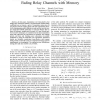Free Online Productivity Tools
i2Speak
i2Symbol
i2OCR
iTex2Img
iWeb2Print
iWeb2Shot
i2Type
iPdf2Split
iPdf2Merge
i2Bopomofo
i2Arabic
i2Style
i2Image
i2PDF
iLatex2Rtf
Sci2ools
135
click to vote
CISS
2008
IEEE
2008
IEEE
Achievable rates and training optimization for fading relay channels with memory
—In this paper, transmission over time-selective, flat fading relay channels is studied. It is assumed that channel fading coefficients are not known a priori. Transmission takes place in two phases: network training phase and data transmission phase. In the training phase, pilot symbols are sent and the receivers employ single-pilot MMSE estimation or noncausal Wiener filter to learn the channel. Amplify-and-Forward (AF) and Decode-andForward (DF) techniques are considered in the data transmission phase and achievable rate expressions are obtained. The training period, and data and training power allocations are jointly optimized by using the achievable rate expressions. Numerical results are obtained considering Gauss-Markov and lowpass fading models. Achievable rates are computed and energy-per-bit requirements are investigated. The optimal power distributions among pilot and data symbols are provided.
Achievable Rate Expressions | CISS 2008 | Data Transmission Phase | Information Management | Training Phase |
Related Content
| Added | 29 May 2010 |
| Updated | 29 May 2010 |
| Type | Conference |
| Year | 2008 |
| Where | CISS |
| Authors | Sami Akin, Mustafa Cenk Gursoy |
Comments (0)

